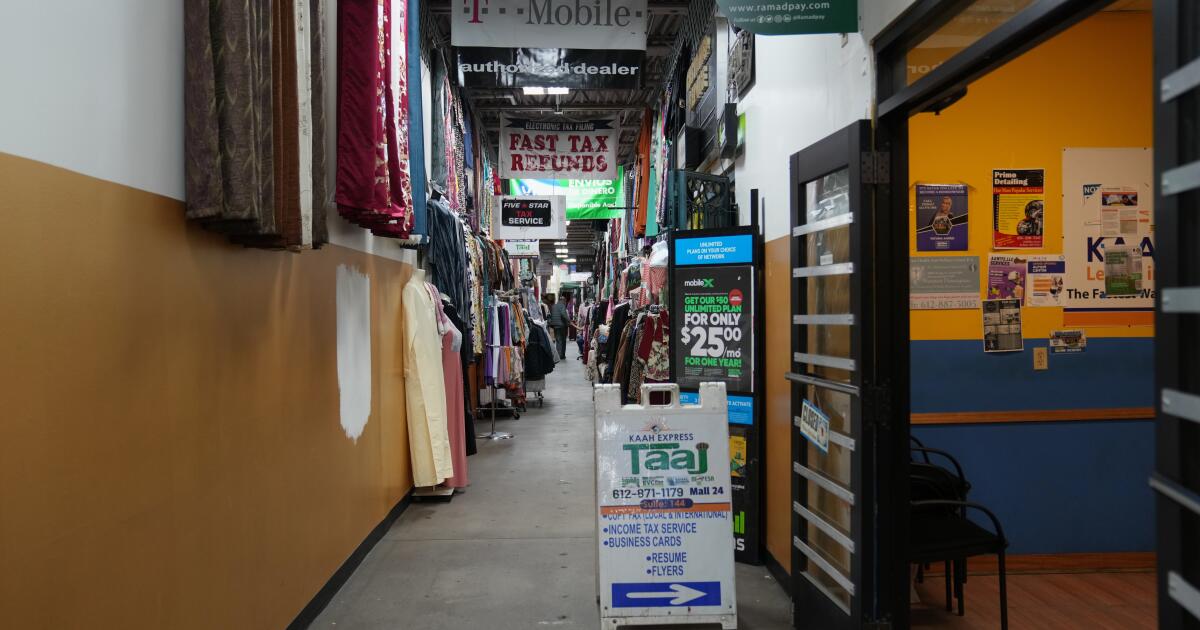Somali businesses struggle during the Minneapolis ICE crackdown
MINNEAPOLIS — Rows of businesses stood shuttered inside a sprawling complex of Somali businesses on a recent afternoon.
Karmel Mall in south Minneapolis contains more than 100 small businesses in suites offering clothing and food, insurance and accounting services, and much more.
One day last week, the noisy hallways inside lay quiet, save for occasional chatter between neighboring vendors. The smell of fried food still wafted from the bakeries, the central heating hummed, and the sound of Quran recitation flowed quietly from some shops.
But many sellers sat alone in their clothing stores, waiting for the occasional customer to walk by. Everyone is afraid of federal immigration agents, business owners said. Sellers and customers, citizens and noncitizens. Some don’t bother opening shop because they aren’t expecting any customers.
“It’s been like this for three weeks now,” said Abdi Wahid, who works at his mother’s convenience store in the mall. “Everywhere it’s all been closed up, all the stores.”
Karmel Mall is an economic hub for the area’s Somali population, the largest in the United States. It also features housing, a mosque and Quran classes, serving as a robust community center for the area.
The economic impact of the Trump administration’s so-called Operation Metro Surge stretches beyond the Somali community: Many immigrants are on edge, afraid to go to work or leave their homes amid the immigration crackdown.
President Trump has made the Somali community a special target of his deportation rhetoric after a recent government fraud case in Minnesota included some Somali defendants. Since December, Trump has repeatedly insulted members of the community, calling them “garbage” and saying “they contribute nothing.”
Wahid said early afternoons at the family business once meant 15 to 20 customers. These days, it’s tough to get one.
Wahid is a citizen, but he said the fear extends beyond undocumented immigrants. Citizens are also scared of coming in, especially after the ICE officer killing of Renee Nicole Good and the ICE raid at Roosevelt High School in south Minneapolis.
“I think that caused a lot of people to not even want to come,” he said, because they could be targeted “just because of their race.”
Homeland Security Assistant Secretary Tricia McLaughlin said in a statement that law enforcement uses “reasonable suspicion” under the 4th Amendment to make arrests.
“A person’s immigration status makes them a target for enforcement, not their skin color, race or ethnicity,” she said.
Upstairs, Bashir Garad runs Safari Travel & Accounting Services. Not only has the crackdown in Minneapolis meant he’s lost almost all his customers, but his clients are canceling upcoming trips because they’re worried they won’t be let back into the country.
“They see a lot of unlawful things going on in the city,” he said. “They look at something bad, and then they think some bad things may happen to them.” The majority of his clients are East African, and nearly all are U.S. citizens. They still hesitate to travel.
“The government is not doing the right thing,” Garad said. “If there’s a criminal, there’s a criminal. Regardless, there are ways to find the criminal, but to marginalize the community’s name, and a whole people, that is unlawful.”
Ibrahim Dahiye, who sells electronics, said winter always used to be slow, “but now it’s totally different. No one comes here. All the stores are closed, few are open.”
Since the crackdown began, Dahiye said his business is down $20,000 monthly, and he’s now pooling funds to make rent.
He said he’s lost most of his customers. His employees are too scared to come to work. He tapped his jacket pocket, saying he keeps his passport on him at all times.
“I don’t know what we can do,” Dahiye said. “We believe in Allah, but we can’t do anything.”
Raza writes for the Associated Press.
